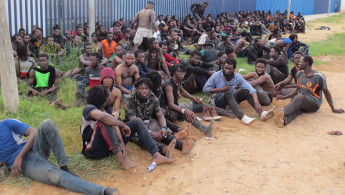Morocco arrests 300 migrants as they attempted to cross into Spain
Morocco's security forces have thwarted an attempt by hundreds of migrants to cross the border into the Spain-controlled enclave of Ceuta, reported local media over the weekend.
In the northern city of Fnidiq, around 300 migrants were arrested in the most recent attempt to cross the Ceuta gate border on 5 November.
Local media said Injuries were registered among migrants and security forces.
Over the weekend, Moroccan authorities have reportedly launched a manhunt to arrest other irregular migrants in the nearby forests around the gate.
According to Moroccan authorities, at least 14,746 attempts to illegally cross the border into Spain were foiled in the first quarter of 2022.
"The social situation in the post-Coronavirus and amid Russian-Ukrainian war have deepened migrants' struggle, not to mention the loss of a sense of hope among young people for the future," Mohammed Ben Aissa, head of the Northern Observatory for Human Rights, a non-governmental organisation, told The New Arab.
The hearing procedures for the arrested migrants will take place in the upcoming days.
Over the past months, Rabat has sentenced dozens of migrants to prison terms on charges including 'illegal entry' and 'belonging to criminal gangs'.
Many faced the court while still nursing bruises, injuries and grief following the Melilla massacre, where at least 23 migrants were killed and 77 were injured.
On 24 June, around 2,000 migrants attempted to cross the Barrio Chino fence, one of many border passages separating Morocco's Nador and the Spanish-controlled enclave of Melilla, one of the European Union's only land borders with Africa.
On 1 November, an investigation by BBC Africa eye held both Moroccan and Spanish authorities accountable for the massacre.
The Moroccan Association of Human Rights (AMDH), a non-governmental organisation, argues that the Melilla massacre was a "token of love" from Rabat to its new friend Madrid.
"The death of those young Africans on the European borders is a warning to us about the deadly nature of the Moroccan-Spanish security collaboration on immigration," Omar Naji, a member of the AMDH, said to TNA.
In recent years, the borders of Melilla and Ceuta have become diplomatic leverage to resolve conflicts and seal deals.
In 2021, 8,000 migrants surged across the Moroccan-Spanish border in what was widely seen as a punitive move by Rabat against Madrid for hosting Brahim Ghali, the head of the Polisario Front, a Western Saharan separatist group.
At the time, Madrid accused Rabat of "blackmail" and Rabat responded by recalling its ambassador to Madrid.
But after a year of trading barbs, Madrid decided in March 2022 to walk away from its decades-long policy of neutrality on Western Sahara and backed Morocco’s autonomy plan in the disputed territory.
The decision cost Madrid the friendship of Algeria, a loyal sponsor of the separatist Front of Polisario, but gained instead 'strong cooperation' with Rabat, mainly on issues of migration.





 Follow the Middle East's top stories in English at The New Arab on Google News
Follow the Middle East's top stories in English at The New Arab on Google News


